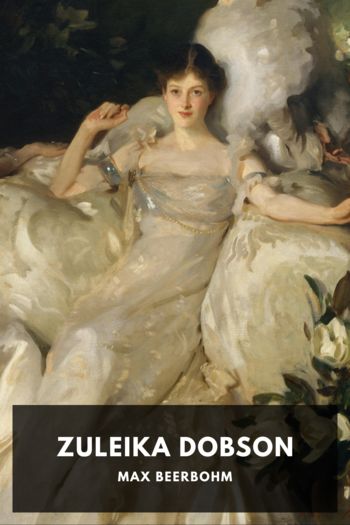The Works of Max Beerbohm - Max Beerbohm (electric book reader .txt) 📗

- Author: Max Beerbohm
Book online «The Works of Max Beerbohm - Max Beerbohm (electric book reader .txt) 📗». Author Max Beerbohm
The Antiguan was already on the brink of middle-age when he first trod the English shore. But, for all his thirty-seven years, he had the heart of a youth, and his purse being yet as heavy as his heart was light, the English sun seemed to shine gloriously about his path and gild the letters of introduction that he scattered everywhere. Also, he was a gentleman of amiable, nearly elegant mien, and something of a scholar. His father had been the most respectable resident Antigua could show, so that little Robert, the future Romeo, had often sat at dessert with distinguished travellers through the Indies. But in the year 1807 old Mr. Coates had died. As we may read in vol. LXXVIII of The Gentleman’s Magazine, “the Almighty, whom he alone feared, was pleased to take him from this life, after having sustained an untarnished reputation for seventy-three years,” a passage which, though objectionable in its theology, gives the true story of Romeo’s antecedents and disposes of the later calumnies that declared him the son of a tailor. Realising that he was now an orphan, an orphan with not a few grey hairs, our hero had set sail in quest of amusing adventure.
For three months he took the waters of Bath, unobtrusively, like other well-bred visitors. His attendance was solicited for all the most fashionable routs, and at assemblies he sat always in the shade of some titled turban. In fact, Mr. Coates was a great success. There was an air of most romantic mystery that endeared his presence to all the damsels fluttering fans in the Pump Room. It set them vying for his conduct through the mazes of the Quadrille or of the Triumph, and blushing at the sound of his name. Alas! their tremulous rivalry lasted not long. Soon they saw that Emma, sole daughter of Sir James Tylney Long, that wealthy baronet, had cast a magic net about the warm Antiguan heart. In the wake of her chair, by night and day, Mr. Coates was obsequious. When she cried that she would not drink the water without some delicacy to banish the iron taste, it was he who stood by with a box of vanilla-rusks. When he shaved his great moustachio, it was at her caprice. And his devotion to Miss Emma was the more noted for that his own considerable riches were proof that it was true and single. He himself warned her, in some verses written for him by Euphemia Boswell, against the crew of penniless admirers who surrounded her:
“Lady, ah! too bewitching lady! now beware
Of artful men that fain would thee ensnare
Not for thy merit, but thy fortune’s sake.
Give me your hand—your cash let venals take.”
Miss Emma was his first love. To understand his subsequent behaviour, let us remember that Cupid’s shaft pierces most poignantly the breast of middle-age. Not that Mr. Coates was laughed at in Bath for a love-a-lack-a-daisy. On the contrary, his mien, his manner, were as yet so studiously correct, his speech so reticent, that laughter had been unusually inept. The only strange taste evinced by him was his devotion to theatricals. He would hold forth, by the hour, upon the fine conception of such parts as Macbeth, Othello and, especially, Romeo. Many ladies and gentlemen were privileged to hear him recite, in this or that drawing-room, after supper. All testified to the real fire with which he inflamed the lines of love or hatred. His voice, his gesture, his scholarship, were all approved. A fine symphony of praise assured Mr. Coates that no suitor worthier than he had ever courted Thespis. The lust for the footlights’ glare grew lurid in his mothish eye. What, after all, were these poor triumphs of the parlour? It might be that contemptuous Emma, hearing the loud salvos of the gallery and boxes, would call him at length her lord.
At this time there arrived at the York House Mr. Pryse Gordon, whose memoirs we know. Mr. Coates himself was staying at number — Gay Street, but was in the habit of breakfasting daily at the York House, where he attracted Mr. Gordon’s attention by “rehearsing passages from Shakespeare, with a tone and gesture extremely striking both to the eye and the ear.” Mr. Gordon warmly complimented him and suggested that he should give a public exposition of his art. The cheeks of the amateur flushed with pleasure. “I am ready and willing,” he replied, “to play ‘Romeo’ to a Bath audience, if the manager will get up the play and give me a good ‘Juliet’; my costume is superb and adorned with diamonds, but I have not the advantage of knowing the manager, Dimonds.” Pleased by the stranger’s ready wit, Mr. Gordon scribbled a note of introduction to Dimonds there and then. So soon as he had “discussed a brace of muffins and so many eggs,” the new Romeo started for the playhouse, and that very day bills were posted to the effect that “a Gentleman of Fashion would make his first appearance on February 9 in a rôle of Shakespeare.” All the lower boxes were immediately secured by Lady Belmore and other lights of Bath. “Butlers and Abigails,” it is said, “were commanded by their mistresses to take their stand in the centre of the pit and give Mr. Coates a capital, hearty clapping.” Indeed, throughout the week that elapsed before the première, no pains were spared in assuring a great success. Miss Tylney Long showed some interest in the arrangements. Gossip spoke of her as a likely bride.
The night





Comments (0)